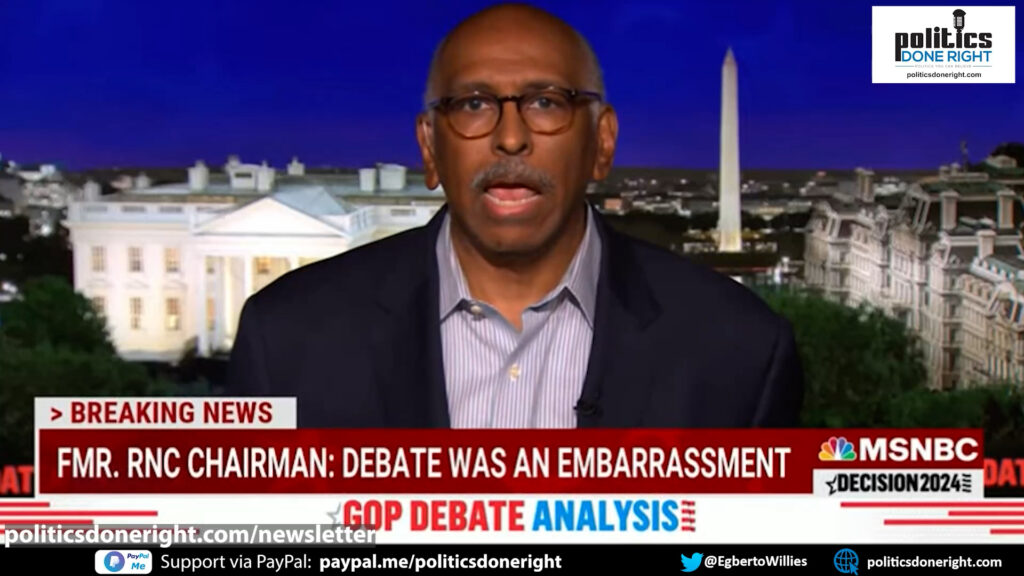Former RNC Chair Michael Steele didn’t mince his words as he harshly critiqued the 2nd 2024 Primary Republican debate. He said it was a crap show and embarrassing.
Michael Steele: Republican debate was a crap show.
The recent remarks by Michael Steele, the former RNC Chair, on MSNBC should serve as an alarm bell for anyone concerned with the current trajectory of American politics, particularly within the Republican Party. Steele’s scathing critique of the Republican debate highlights the ideological disarray within the GOP and raises valid questions about the Democratic Party’s strategy for future elections.
In this clip:
- Former RNC Chair Michael Steele criticized the Republican debate as an “embarrassing crap show,” stating that the candidates seemed to live in an alternate reality disconnected from critical issues like race and foreign policy.
- Steele specifically rebuked Senator Tim Scott’s assertion that America is not a racist country, describing the debate as a “farce” and a “national embarrassment” for the Republican Party.
- Steele expressed disbelief that Democrats were tied with Republicans given the state of the GOP, questioning why Democrats are struggling to communicate effectively to the American people.
- Steele noted that no Republican candidates could discuss substantive issues, such as Russia’s role in current geopolitics, indicating a lack of depth and vision within the party.
- Democrats should urgently change their tactics, moving away from traditional methods and reaching out to social media influencers, independent media, and independent progressive bloggers to better convey their message.
First, let’s talk about Steele categorizing the Republican debate as an “embarrassing crap show.” This is not a descriptor to be taken lightly, especially from someone who once held a leadership role within the party. Steele points out that the candidates seemed to be living in an “alternate reality,” a dangerous place where complex issues such as systemic racism are glossed over or entirely denied. For instance, Steele specifically called out Senator Tim Scott’s statement that America is not a racist country as a “farce.” Such statements are not just politically divisive but also intellectually dishonest.
Steele’s critique moves beyond individual statements to the overall tenor of the debate. He emphasized that the candidates were not only avoiding the topic of racism but also lacked substantive discussion on vital geopolitical issues like Russia’s aggressive moves on the world stage. Given the complex and interconnected challenges that the United States faces, from the rise of authoritarianism to the urgency of climate change, a lack of depth in policy discussions is more than an embarrassment—it’s a crisis. The absence of these key discussions is indicative of a party that is more concerned with optics and rhetoric than with meaningful policy solutions. This is a lamentable state of affairs, especially considering the rich policy history of the GOP, which was once capable of tackling monumental challenges like the Cold War.
Steele’s criticism extends beyond the Republican Party. He also questions why the Democratic Party, despite its theoretically more substantive policy discussions, is essentially tied with the GOP. Steele’s comments suggest that Democrats have not succeeded in effectively communicating their policy positions and principles to the American public. To put it bluntly, if the Democrats can’t win public opinion against a party that Steele describes as a “crap show,” what does that say about their communication strategies?
Democrats must change their tactics and engage more proactively with social media influencers, independent media, and progressive bloggers. In the age of digitalization, traditional campaign methods may no longer suffice. Grassroots movements have proven their effectiveness time and again.
Steele’s commentary is a critical reflection on the state of American politics. It challenges us to think about the kind of discourse we are willing to accept from our political leaders and the steps we must take to ensure a more substantive, inclusive, and reflective political debate in the coming years. The Republican Party, according to Steele, is failing on that front. However, Democrats too have their work cut out for them, especially if they wish to counter the GOP’s “alternate reality” with something more substantive and resonant.

